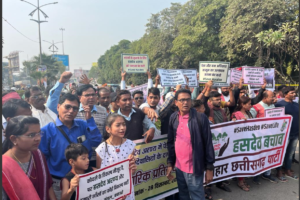A Memorandum submitted by the Adivasi Ekta Parishad (Bhumi Sena) to central and state governments and concerned departments, protesting against the proposed: Delhi–Mumbai industrial Corridor, Mumbai–Ahmedabad High Speed Railway Corridor (Bullet Train), Port at Vadhavan, Power Grids constructed devastating people’s livelihood and environment, Mumbai-Vadodara Express Highway and Musari Dam on Surya river is reproduced below. The above mentioned projects are totally useless, non-scientific, non-essential, inhuman, irrelevant and also anti-environmental, anti-forest, anti-farming land and anti-agriculture. It will not only destroy the livelihood of the indigenous people of the area, as well as of millions of families living in the area affected by these. These projects are clear invitation to the natural disasters as earth quacks, Tsunamis, cyclones, floods, famine etc.
On 9th August, the 75th anniversary of “Quit India” movement and “World Adivasis Day”, at Thalassery in Palghar district a massive mobilization of tens of thousands of adivasis, fisher people and other oppressed classes and sections, who are affected by these projects severely, took place under the initiative of a number of struggling organizations of Maharashtra, Dadra-Nagar Haveli and Gujarat, demanding that MNCs quit India and corporate houses curbed so that against the anti-people ruling system a people’s alternative can be realized — Red Star
Introduction
The Japan International Consultants for Transportation Co. Ltd., Oriental Consultants Co. Ltd. and Nippon Koil Co. Ltd appointed to the TARU Leading Edge Pvt. Limited to prepare an Indigenous People Plan (IPP) for the affected tribal area / people in the Mumbai – Ahmedabad High Speed Railway Corridor. The Report prepared by the TARU Leading Edge Pvt. Ltd. New Delhi on Mumbai – Ahmedabad High Speed Railway Corridor (Bullet Train) under HSR: Indigenous People Plan (April 2015) has also raised many points of negative impacts going to be faced to the indigenous people of the decided area due to said projects
As per the descriptions on the Project; The Indigenous Peoples Planning (IPP) provides guidance in formulating Indigenous Peoples Plans (IPPs) and to ensure that if indigenous populations are affected by the HSPR, they: (1) are adequately and fully consulted, (ii) receive benefits and compensation equal to that of the mainstream population, (iii) are provided with special assistance as per laws and policies because of their vulnerabilities vis-a-vis the mainstream population, and (iv) receive adequate protection against project adverse impacts on their culture identities.
The proposed IPP should be prepared in consultation with the tribal families / peoples of district Palghar (Maharashtra) and Valsad (Gujrat). The villages located within the project influence district have Schedule Tribe population varying in a range of 70 percent to 80 percent of the total population. In order to have a more focused indigenous plan, these issues have been grouped into (i) issues that are directly related to the project development for which measures will have to be taken up under the project to address them and (ii) issues which are outside the scope of the project but institutional collaboration could help the tribal in their development.
(Used the term indigenous peoples to refer to a distinct, vulnerable, social and cultural group possessing the following characteristics in varying degrees: (i) self-identification as members of a distinct indigenous cultural group and recognition of this identify bythe others; (ii) collective attachment to geographically distinct habitats or ancestral territories in the project area and to the natural resources in these habitats and territories: (iii) customary cultural, social, economic, social or political institutions that are separate from those of the dominant society and culture: and (iv) an indigenous language, often different from the official language of the country or region, Other terms used in different countries to refer to these groups include “indigenous ethnic minorities,” “aboriginals, “hill tribes,” “minority nationalities,” “scheduled tribes,” and “Tribal Groups”)
The baseline data is to be collected through pre-tested structured taking the scheduled tribes in to consideration. The most important component of IPP has been to assess the type and magnitude of impacts, both positive and negative on the tribal communities. The IPP recognizes the distinct circumstances that expose Indigenous Peoples to different types of risks and impacts from the HSPR project. As social groups with identities that are often distinct from dominant groups in their national societies, Indigenous Peoples are frequently among the most marginalized and vulnerable segments of the population. As a result , their economic, social and legal status often limit their capacity to defend their rights to lands, territories, and other productive resources, and restricts their ability to participate in and benefit from development. At the same time, the policy, together with the Involuntary Resettlement policy, recognizes that Indigenous Peoples play a vital role unsustainable development and emphasizes that the need for conservation should be combined with the need to benefit Indigenous Peoples in order to ensure long-term sustainable management of critical ecosystems
The implementation of HSPR and other projects mentioned above entails a number of activities that will have a bearing on the existing socio-economic sector of the rail corridor and its inhabitants. Among these activities are structure acquisition and rail construction related activities. In the RAP context implementation of the HSPR will have both positive and negative impacts.
Provision of secondary employment should ensure opportunities for the local population, and substantial increases of income-generating activities. This will lead to diversification of some household economies. For example a number of people will be employed during the construction phase across the villages. Local people will also have the opportunity to establish small scale food service to cater for the needs of the construction workers. The additional work force on the construction activities will boost albeit in the short-term local community economy within the corridor. The increased income generation activities will provide specially for women additional income which in the existing cultural context implies improved household socio-economic statuses. The project is anticipated to have some negative impacts which however can be mitigated. These include:
-
Loss of property with negative impacts on the livelihoods of the people.
-
Vulnerable groups will be affected more.
-
Inability to find equal productive land.
-
Inability to find equally prime business area. These are the major areas of potential impacts to be considered for this study.
The following acts should be taken in to consideration at the time of starting the project:
-
Panchayats (Extension to Scheduled Areas) Act, 1996
-
National Rehabilitation and Resettlement Policy (NRRP), 2007
-
United Nations Declaration on the Rights of Indigenous Peoples
-
The Scheduled tribes and Other Traditional Forest Dwellers (Recognition of Forest Rights) Act, 2006, which is popularly known as Forest Rights Act (FRA)
-
The Scheduled Caste and Scheduled Tribes (Prevention of Atrocities) Act, 1989
-
Land Acquisition, Rehabilitation and Resettlement Act (LARR), 2013
-
Annual Reports of selected districts for coverage of sample villages
The above is only one aspects of the matter, the following aspects also pertinent to study in the regard of said projects:
-
Study on Environmental impacts
-
Study on Agriculture Land damages impacts
-
Study on Pollution increase impacts
-
Study on Natural disasters due to felling trees etc.
-
Study on temperature hicks due to damages of forest
-
Study on Mountain damages
-
Study on bad impacts on Drinking Water resources
-
Study on following disasters; Cyclone, Earthquakes, Floods, Famine, Tsunami etc.
Reasons of the Protest of the Projects
i. No requirement of the proposed Projects to the Nation and majority population indigenous and tribles of the area and country as well.
ii. Intentionally and deliberately concealed and ignored the negative impacts on the environment, forest, agriculture, farming, mountains, water resources, whether and also ignored the negative effect on the livelihood of the majority population of indigenous and tribles of the area and country as well by the proposed project and also due to the projects the invitation to the natural disasters as Cyclone, Earthquakes, Floods, Famine, Tsunami etc.
iii. Total ignorance and violations of the Constitutional, Democratic, legal and human rights of the majority of population of indigenous and tribles of the area and country arrived by the related Government-Non Government officials, departments etc. in the favour of the proposed project.
iv. Not secured and not insured the equal rights, benefits and involvements (participation) of the majority of population of indigenous and tribles of the area and country in the proposed project.
v. The Social, Economic, Human, Natural and Environment basic interests and requirement of the majority of population of indigenous and tribles of the area and country are not protected.
vi. It is also come to know that the British Govt. brought the guidelines to protect 33%forest of the total area of the country, but after independence of the country the Indian Govt.’s proposed around the 20% forest of the total area of the country.
vii. Due to so-called developments by the proposed projects the majority population of the indigenous and tribles of the area would be become bounded labour in future by the reason of unemployment due to the destroy their traditional employments in agricultural and forests etc.
ix. To protest against the wastage of public funds for unnecessary developments.
x. To protest against the development to become the country as sales man (Commission taking Country), to selling the materials, goods and products of the European and developed countries and total employment, profits and benefits also will go to the said countries, because the India is not a production making country, therefore, if only Govt. deciding to proposed the Vadhavan Port to receive the readymade products and goods from the developed countries and said readymade material will be sale in the Malls, Big Bazars, High Profile Markets than the ratio of the employment generation will be zero.
xi. To protest against the damage / wastage of agriculture lands for the purposes of so-called projects and the huge employments will be crush / abolish and majority population will become un-employment those are totally depends on the agriculture and getting food, medicine, employment and dignity to the entire family members.
xii. To protest against the more Loan burden on the country from the World Bank and other countries to establish so-called projects, whereby, the country already suffering from the previous loans, even though the interest of the previous loans are difficult to pay as per the financial report of the country.
Though India has more than 70 to 80 % agriculture land and forest, due to anti-farmer, pro-corporate policies adopted by the previous and present governments we have continuously losing agriculture land and forests. The government pursues an industrial and ‘Green Revolution’ based development policy, ignoring the interests of the crores of farmers including the indigenous people depending on agriculture. The government do not take in to consideration the ecological catastrophe and the damage caused to people’s long term interests I the so-called developed countries due to this development paradigm promoted by the international finance capital and MNCs while mechanically copying them in our country of 125 crores of people, vast majority of whom are still deprived of basic amenities like food, housing, education, healthcare and livelihood.
We appeal to the government through you to reject the above projects which are anti-people, which violates even existing laws and which shall destroy the livelihood of tens of millions of people besides causing unimaginable ecological destruction.
With regards
Kaka Kalu Ram Dhodade,
Raju Kashinath Dadoda
Adivasi Ekta Parishad











